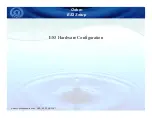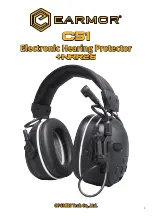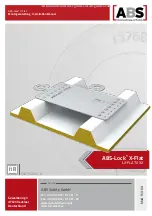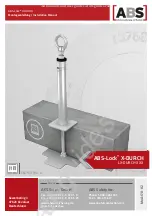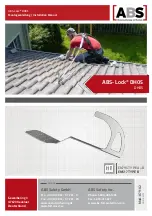
Floor Mount
When mounting the ColorBlast 12 TR on the floor, ensure that the
fixture sits flush to the surface and use mounting hardware suitable
for the mounting surface. (See Fig. 2.)
Fig. 2
Attaching the Safety cable
Each fixture is designed for use with a safety cable. When required
by local or state code, or by a Structural Engineer, attach a safety
cable from the fixture to the mounting surface.
1. Locate the safety cable bracket on rear of the ColorBlast 12 TR.
(See Fig. 3.)
2. Attach the safety cable to the mounting surface. Consult a
Structural Engineer and refer to applicable standards for your
specific application to determine the proper method for mounting
the safety cable to the installation surface.
Safety cables used in the installation must meet the following
minimal requirements:
material
:
316 Stainless Steel
size
:
5/64-inch (0.78-inch nominal diameter) or
larger, minimum break load must be
greater than 400 pounds. Maximum diam-
eter is 3/16-inch.
construction
:
7 x 7 (49 wires) preformed stranded
end
terminations
: Determined by installer and/or owner
mounting
method
: Determined by installer or owner
Making electrical connections
ColorBlast 12 TR is compatible with Color Kinetics PDS-750TR
power/data supplies.
connecting Power
ColorBlast 12 TR requires 24VDC. After installing the light fixtures,
connect the power/data cable to the power/data supply. The PDS-
750TR supports 12 ColorBlast 12 TR fixtures.
caution
:
Do not overload the power/data supply. Doing so may
result in minor or moderate injury or property damage and will
void the warranty.
note
: Each light must receive power directly from a power/data
supply. You cannot daisy chain power from one ColorBlast 12 TR
to another. The ColorBlast 12 TR cable contains three color-coded
wires through a 4-pin XLR connector. (See Fig. 4.)
• Black = GND
• White = Data
• Red = +24 VDC
lenS rePlAceMent
The ColorBlast 12 TR is designed to allow the user to change
between two lens options - clear and frosted. Both lenses are includ-
ed with the fixture.
The clear lens option features a 10º beam angle and is designed
for long throw, spot lighting applications. The frosted lens option
provides a 23º beam angle and is designed for wash lighting appli-
cations.
To change lenses:
1. Remove the protective cover from the fixture. (See Fig. 5.)
2. There are two lock-down screws located on the fixture sides, one
per side at the top of the bezel. Remove these two screws. (See
Fig. 6.)
note
: The bezel pivots at the edge closets to the base. It is not
necessary to remove the pivot screws.
3. Using the tabs on the bezel, pivot the bezel forward to access
the lens. (See Fig. 6).
4. Remove the installed lens and replace it with the desired lens.
Make sure the gasket around the lens is properly fitted.
5. Close the bezel, install the lock-down screws, and replace the
protective cover.
routIne MAIntenAnce
cleaning:
Use a soft cloth. Clean surface with mild soap and
water or window cleaner.
lubrication:
As needed, apply light household oil to the hinges.
IMPortAnt InForMAtIon
Strobe Warning
There is anecdotal evidence which suggests that strobe lighting
may induce epileptic symptoms in certain susceptible individu-
als, although no associated product warnings have been issued
by the United States government according to the Food and Drug
Administration.
If strobe lights are used, some international regulatory agencies¹
recommend keeping flicker rates at or below four flashes per sec-
ond (as less of the flicker-sensitive population will then be at risk of
an attack). This flicker rate applies only to the overall output of any
group of lights in direct view. However, when more than one strobe
light is used, the flashes should be synchronized. End users should
also consider issuing a warning, alerting audience or viewers to the
presence of strobe lighting.
temperature Monitoring
For protection from extreme temperatures, ColorBlast 12 TR has
been designed with a temperature monitoring feature. If operating
temperatures rise to an unsafe level, a compensation circuit is trig-
gered and the ColorBlast 12 TR operation is interrupted, causing
the lights to turn dull red. After 30 minutes the lights will auto-cycle.
To prevent additional power shut-downs, determine the cause of the
overheating and correct the problem.
If any problems occur during usage, unplug the product immediately
and call Color Kinetics Technical Support Group: 1-888-FULL RGB
or 617-423-9999 or email us: [email protected].
colorBlASt 12 tr SPecIFIcAtIonS
color
range
16.7 million (24-bit) additive RGB colors;
continuously variable intensity output range
source
High intensity power light emitting diodes (LEDs)
beam
angle
23º beam angle (frosted), 10º (clear)
housing
Die Cast Aluminum, black
protective
cover
TPV Elastomer, black
lens
Soft-focus tempered glass or clear tempered glass
connectors
6-foot (1.83cm) Unified power and data cable with
4-pin XLR connector
listings
UL/cUL
, CE
coMMunIcAtIon SPecIFIcAtIonS
data
interface
Color Kinetics data interface system
control
Color Kinetics controllers or other DMX512 (RS485)
compatible if using Color Kinetics power/data supply
electrIcAl SPecIFIcAtIonS
power
requirement
24VDC
power
consumption
50W Max. at full intensity (full RGB)
power
supply
PDS-750TR (ITEM# 109-000019-00)
envIronMentAl SPecIFIcAtIonS
temperature
range
-40ºF to 122ºF (-40ºC to 50ºC) operating temperature
-4ºF to 122ºF (-20ºC to 50ºC) starting temperature
led Source lIFe
In traditional lamp sources, lifetime is defined as the point at which 50% of the lamps fail. This is also
termed Mean Time Between Failure [MTBF]. LEDs are semiconductor devices and have a much longer
MTBF than conventional sources. However, MTBF is not the only consideration in determining useful
life. Color Kinetics uses the concept of useful light output for rating source lifetimes. Like traditional
sources, LED output degrades over time (lumen depreciation) and this is the metric for SSL lifetime.
LED lumen depreciation is affected by numerous environmental conditions such as ambient tempera-
ture, humidity, and ventilation. Lumen depreciation is also affected by means of control, thermal
management, current levels, and a host of other electrical design considerations. Color Kinetics
systems are expertly engineered to optimize LED life when used under normal operating conditions.
Lumen depreciation information is based on LED manufacturers’ source life data as well as other third
party testing. Low temperatures and controlled effects have a beneficial effect on lumen depreciation.
Overall system lifetime could vary substantially based on usage and the environment in which the
system is installed.
Temperature and effects will affect lifetime. Color Kinetics rates product lifetime using lumen deprecia-
tion to 50% of original light output. When the fixture is running at room temperature using a color
wash effect, the lifetime is in the range of 80,000-100,000 hours. This is based on LED manufactur-
ers’ test data. High output is defined as any LED device that is 1/2 watt or above. For more detailed
information on source life, please see www.colorkinetics.com/lifetime.
WArrAnty
This product is sold pursuant to CK’s Standard Terms and Conditions (the “T&Cs”) which may be
found at http://colorkinetics.com/howtobuy/buy/terms and which contain important provisions,
including, among others, Limited Warranty, exclusions and limitations on CK’s liability for damages,
and restrictions on the remedies that are available to you.
1.
Guide to Health, Safety and Welfare at Pop Concerts and Similar Events, HMSO Publications (UK)
Aim fixture and
lock in place.
FRONT VIEW
CARABINER
CLIP
END USER SPECIFIES
REQUIRED END TERMINATOR
AND ANCHORING
Fig. 3
Color Kinetics
Controller or DMX512
Compatible controller
PDS-750TR
DMX Out
(for multiple
power/data
supplies)
DMX In
110-240VAC
Fig. 4
Protective Cover
Fig. 5
Lock-down Screws
Lens
Bezel
Fig. 6



